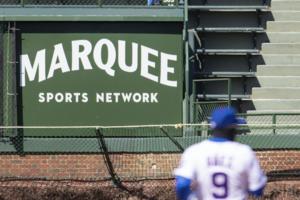Sports
/ArcaMax

Dylan Hernández: Roki Sasaki a playoff reliever? Don't put it past desperate Dodgers.
LOS ANGELES — There's desperate, and there's desperate to where you're looking for Roki Sasaki to be the answer to your team's late-inning problems.
The same Roki Sasaki who hasn't pitched in a major league game in more than four months because of shoulder problems.
The same Roki Sasaki who posted a 4.72 earned-run average in eight starts.
...Read more

Paul Sullivan: Should Gov. JB Pritzker's boycott suggestion stop Cubs fans from watching Marquee?
CHICAGO — Should Chicago Cubs fans stop watching Marquee Sports Network in the final week of their first playoff season in five years?
Should Bears fans tune out their “Monday Night Football” game against the Washington Commanders on Oct. 13 on ABC-7 and ESPN?
Gov. JB Pritzker seems to think so.
The Democrat from Illinois urged citizens...Read more

Fan gives back Mike Trout's 400th career home run ball, but not before getting to do something cool
LOS ANGELES — Many people have a fond memory of playing catch with someone special — a parent, a grandparent, a sibling, a lifelong friend.
A fan who sat 485 feet from home plate at Coors Field on Saturday probably never dreamed he'd be doing so with a future Hall of Famer.
But thanks to his quick thinking, the fan, whose first name ...Read more

Mariners sweep Astros, close in on AL West title
HOUSTON – When he came to Seattle before the 2019 season, he was considered by many in Major League Baseball an underachieving prospect who couldn’t stay healthy with an attitude problem. The Mariners believed that a new team, a chance to be an every-day player and the freedom to be himself, would unlock his talent and turn him into a ...Read more

Rays finish Steinbrenner Field stay with win over contending Red Sox
TAMPA, Fla. — The Tampa Bay Rays wrapped up the home-away-from-home portion of their schedule Sunday night on a winning note.
Their 7-3 victory over the contending Boston Red Sox gave them a 41-40 record for the first, and they strongly hope only, season playing at Steinbrenner Field.
Christopher Morel had his hand all over the win, driving ...Read more

Giants avoid being swept by Dodgers as McDonald deals, offense finds late life
LOS ANGELES — On Sunday afternoon at Dodger Stadium, Trevor McDonald made the first start of his major-league career. Against a playoff-bound team, McDonald proved himself worthy of making another.
The rookie right-hander turned in the best outing of his young career as San Francisco (77-79) beat Los Angeles 3-1 at Chavez Ravine, avoiding ...Read more

Ranger Suárez throws rare dud in series loss to Diamondbacks, but Phillies' goal remains clear. 'I want to clinch the bye.'
PHOENIX — Ranger Suárez didn’t look back.
Certainly not at the pitch, a slider that hung over the plate before it touched down in the right-field bleachers for a game-breaking three-run homer in the second inning Sunday.
But there wasn’t any point for Suárez — or the Phillies, as a group — to dissect much of anything else from a ...Read more

After Nolan Arenado makes exit, Cardinals youth delivers in win over Brewers
ST. LOUIS — Considering the “uncertainty” this upcoming winter may bring for a retooling Cardinals club, manager Oli Marmol wanted to ensure there’d be a moment Sunday at Busch Stadium for Nolan Arenado to receive recognition in what may have been his final home game as a Cardinal.
Originally scheduled off as a way to prepare his body ...Read more

Royals drop home finale at Kauffman Stadium vs. Blue Jays
KANSAS CITY, Mo. — The Kansas City Royals played their final regular-season game at Kauffman Stadium on Sunday afternoon in front of 32,936 fans.
Despite the great turnout, the Royals fell 8-5 to the Toronto Blue Jays in their home finale. The loss hurt their slim chance of making the postseason and prevented them from closing out their final...Read more

3 questions the Cubs face before the postseason, as the Brewers clinch the division
CINCINNATI — A clinched playoff spot doesn’t eliminate the sting of a series featuring missed opportunities for the Chicago Cubs.
The Cubs were swept by the Cincinnati Reds with a 1-0 loss on Sunday, which wrapped up the division title for the Milwaukee Brewers. In a season that has been defined by limiting the lows, the Cubs (88-68) have ...Read more
Kyle Freeland's strong start lifts Rockies to 3-1 win over Angels
DENVER — The parting gift for Colorado Rockies fans on Sunday afternoon was a gem from veteran left-hander Kyle Freeland and a crisp 3-1 victory over the Los Angeles Angels.
In the final game of the season at Coors Field, the Rockies managed only four hits, but it was enough with Freeland on the mound.
“It’s great to finish off with a ...Read more

Brooks Lee, Royce Lewis home runs help Twins cool off red-hot Guardians in home finale
MINNEAPOLIS — The game was tight, and included an unexpected rally and a couple of clutch home runs. But in the end, the big winner of the Twins’ home finale for 2025 was a surprise: the Detroit Tigers.
Yes, the Twins avoided a four-game sweep to Cleveland, baseball’s hottest team, by rallying for a 6-2 victory at Target Field on Sunday. ...Read more

Mets drop heartbreaker to Nationals; out of a playoff spot for 1st time since April 5
NEW YORK — The Mets were extra unlucky Sunday afternoon at Citi Field, seeing Washington Nationals center fielder Jacob Young rob both Brett Baty and Francisco Alvarez of home runs. But they did themselves few favors in a 3-2 loss.
The Nats, the last-place team in the NL East, took the series, 2-1, and the Cincinnati Reds (80-76) edged the ...Read more

Padres survive White Sox with 3-2 victory
CHICAGO — On the San Diego Padres’ slow walk to the postseason, they were almost waylaid once again by the walk.
But their pitchers exploited enough batters on an inexperienced team that is now two losses from 100 for the season, and the Padres held on for a 3-2 victory over the Chicago White Sox on Sunday.
The Padres looked as uninspired ...Read more

Ben Rice's extra-inning grand slam lifts Yankees past Orioles
BALTIMORE — The New York Yankees ended their final road trip of the regular season with a 7-1, 10-inning win over the Baltimore Orioles on Sunday, securing a four-game series victory after Ben Rice smoked a grand slam in the final frame.
The go-ahead blast came in a left-on-left matchup, as Rice’s fourth hit of the game deposited a Keegan ...Read more

Pirates dominant in home-finale win against Athletics
PITTSBURGH — The Pittsburgh Pirates’ 2025 season has ranged from disappointing to disastrous. Their home finale was, in a word, dominant.
The Pirates crushed the Athletics 11-0 on Sunday afternoon in their final game at PNC Park this season. They led 4-0 after two innings, 7-0 after four and 10-0 after the fifth.
Four pitchers combined for...Read more

Freefalling Tigers see losing skid hit 6 with loss to Braves, but keep division lead
DETROIT — It comes down to this:
The Detroit Tigers, once 24 games over .500, held the best record in baseball for four months, had held the top spot in the Central Division alone since April 23 and had a 10-game cushion as recently as Sept. 4, go into Cleveland for three games starting Tuesday still holding a one-game lead in the Central ...Read more

Marc Topkin: For Rays, Steinbrenner Field was a good rental experience but not home
TAMPA, Fla. — As the Rays on Sunday night wrapped up their season-long stay at what some players called their Airbnb stadium, there was much about playing at Steinbrenner Field that went pretty much as they figured it would.
The facilities, designed by and for the usual spring-breaking New York Yankees, were tremendous. Rain and lightning, or...Read more

Dodgers defeat Giants, but Will Smith's playoff availability remains a concern
LOS ANGELES — Seventeen days later, the Los Angeles Dodgers finally know what’s wrong with Will Smith’s hand.
On Saturday, ahead of a 7-5 win against the San Francisco Giants, manager Dave Roberts announced that Smith has a hairline fracture in his right hand and is doubtful to return before the end of the regular season.
The Dodgers are...Read more

Bill Shaikin: Mike Trout hit his 400th career home run. Here's an appreciation, not a lament.
LOS ANGELES — Mike Trout introduced himself to Angels fans at the 2010 Futures Game. In his first performance at Angel Stadium, his magic was on display: beating out an infield single, turning a routine single into a double on sheer hustle, forcing two errors with his speed on ground-balls that could have been scored as hits.
He was not ...Read more
Popular Stories
- Fan gives back Mike Trout's 400th career home run ball, but not before getting to do something cool
- Paul Sullivan: Should Gov. JB Pritzker's boycott suggestion stop Cubs fans from watching Marquee?
- 3 questions the Cubs face before the postseason, as the Brewers clinch the division
- After Nolan Arenado makes exit, Cardinals youth delivers in win over Brewers
- Rays finish Steinbrenner Field stay with win over contending Red Sox





